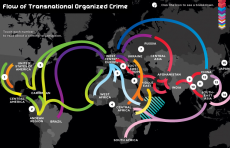
Email: ZYVC057@live.rhul.ac.uk
Total Article : 213
About Me:I'm a graduate student studying International Criminal Law and first started writing for King's News almost 4 years ago! My hobbies include reading, travelling and charity work. I cover many categories but my favourite articles to write are about mysteries of the ancient world, interesting places to visit, the Italian language and animals!

We live in an era of intricate globalisation, an era in which we can communicate with our loved ones even when they find themselves half way across the globe. We think about the expanded concepts like the ‘global impact on humanity’ and feel the need to help our brothers and sisters starving in undeveloped countries. Globalisation, however, has two very different ends: whilst it can be seen as a revolutionary mean to modernise communication roots and make us feel like citizens of the world, defying all geographical borders, globalisation can also be a gold mind for international criminal groups that use technology to plot their offences and revolutionise their targets to have a more global impact. Indeed, although globalised crime has been around for centuries (even the Romans used protectionism as a weapon of power) we really begin talking about global crime as an organised world threat after the Cold War.
The United Nations’ High-level Panel on Treats, Challenges and Change identified global organised crime as one of the ten major challenges to world peace and security. In November 2000 the UN adopted the UN Convention against Transnational Organised Crime to fight the rising phenomenon as UN Member States began to realise just what a severe growing problem transnational organised crime truly is and that it can only be resolved through international cooperation. Also, an Ad Hoc Committee was formed by the United Nations General Secretary in order to tackle the issue though tough measures against global organised crime. These measures include the establishment of domestic criminal offences and the involvement of a new law-enforcement projects. According to a report by the United Nations Office on Drugs and Crime, Southeast Asia produced approximately 48 tons of heroin just in 2011 alone. Most of the cultivation – which is around twice of that produced in Afghanistan, although the latter draws more media attention – takes place in Myanmar as the same UN report estimated that the revenue derived from this line of trading was worth $16.3 billion in that year alone.
As stated in the previous article, illicit trade will usually take place in fragile, corrupt or instable countries where the laws of government can easily be manipulated. The profits created by drug trafficking for example create instability and violence in regions and the routs used for smuggling drugs are likely to be used for carrying weapons in the event of conflict. In Myanmar a major national issue is that it is continuously difficult to control the numerous armed ethic groups of the region which threated its national security. It is widely agreed upon therefore that transnational organised crime should be dealt with by local, regional and global authorities in order to conceal such a widespread growing issue, which is continuously expanding in the highly technological era we live in. I hope you have enjoyed the two articles on global crime so far and once starting my course I hope to write more articles on the subject so if you have any preferences on which organisation you’d like to know more about, or the legal regimes which protect us, please comment below!
Image: http://www.crisisfronts.org/wp-content/uploads/2011/02/Screen-shot-2011-02-22-at-3.04.58-PM.png

0 Comment:
Be the first one to comment on this article.